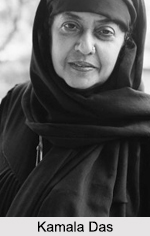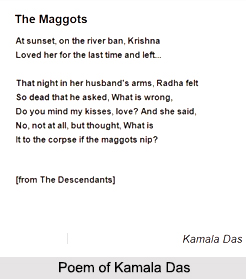 Kamala Das was one of the exceptional poetesses of India. She is also known by her one-time pen name Madhavikutty. Her original name is Kamala Suraiya. She was also a commonly read columnist and wrote on different topics including women`s issues, child care, and politics among others. In 2009, The Times called her "the mother of modern English Indian poetry".
Kamala Das was one of the exceptional poetesses of India. She is also known by her one-time pen name Madhavikutty. Her original name is Kamala Suraiya. She was also a commonly read columnist and wrote on different topics including women`s issues, child care, and politics among others. In 2009, The Times called her "the mother of modern English Indian poetry".
Early life of Kamala Das
Kamala Das was born on March 31, 1934 in Punnayurkulam, Thrissur District in Kerala. She was born to V. M. Nair, an ex- managing editor of the widely-distributed Malayalam daily "Mathrubhumi" and Nalappatt Balamani Amma, a renowned Malayali poetess. She spent her childhood in Kolkata.
Kamala Das was also outrivaled in writing. Her love of poetry began at an early age during the influence of her great uncle, Nalapat Narayana Menon, a well-known writer. She got married to bank officer Madhava Das at the age of 15. Her husband supported her writing interests, and she started writing and publishing both in English and in Malayalam.
Career of Kamala Das
Kamala Das was well-known for her Malayalam short stories in addition to many poems written in English. She inspired women struggling against domestic and sexual domination with her open considerations of sexual desire and marital problems in more than 20 books. Her approach and content both noticeably departed from 19th century romanticized the ideas of love, a choice particularly striking for an Indian Hindu woman. She also broke with conventions in her individual life. Kamala Das explored the womanhood and love. In her poem "An Introduction" from "Summer in Calcutta", she says, "I am every Woman who seeks love".
 Her first book of poetry, "Summer in Calcutta" was a gasp of fresh air in Indian English poetry. She wrote mainly of love, its infidelity, and the resulting suffering. Her second book of poetry, "The Descendants" was even more open. Following are some lines from "The Descendants":
Her first book of poetry, "Summer in Calcutta" was a gasp of fresh air in Indian English poetry. She wrote mainly of love, its infidelity, and the resulting suffering. Her second book of poetry, "The Descendants" was even more open. Following are some lines from "The Descendants":
"Gift him what makes you woman, the scent of
Long hair, the musk of sweat between the breasts,
The warm shock of menstrual blood, and all your
Endless female hungers ..."- The Looking Glass
She published an enterprising autobiography, "My Story" at the age of 42. It was at first written in Malayalam and later she translated it into English. Some of her better-known stories include "Pakshiyude Manam", "Neypayasam", "Thanuppu", and "Chandana Marangal". She wrote some novels, out of which "Neermathalam Pootha Kalam", which was received positively by the reading public as well as the critics, stands out.
Apart from being a wonderful writer, she has also hold positions like Vice chairperson in Kerala Sahitya Academy, chairperson in Kerala forestry Board, President of the Kerala Children`s Film Society, editor of Poet magazine and Poetry editor of Illustrated Weekly of India. She launched a national political party, "Lok Seva Party", aiming shelter to orphaned mothers and encouragement of secularism. In 1984, she unproductively contested in the Indian Parliament elections.
Awards of Kamala Das
Kamala Das had received many awards for her literary contribution including:
•Nominated and shortlisted for Nobel Prize in 1984.
•Asian Poetry Prize-1998.
•Kent Award for English Writing from Asian Countries-1999.
•Asian World Prize-2000.
•Ezhuthachan Award-2009.
•Sahitya Academy Award-2003.
•Vayalar Award2001.
•Kerala Sahitya Academy Award-2005.
•Muttathu Varkey Award.
Works of Kamala Das
Some of the popular Works of Kamala Das are as following:
•Summer in Calcutta.
•The Descendants.
•My Story.
•The Anamalai Poems.
•Padmavati the Harlot and Other Stories.
•Yaa Allah.
•My Mother at Sixty-six.
•Pakshiyude Manam.
•Palayan.
•Dayarikkurippukal.
•Madhavikkuttiyude Unmakkadhakal.
•Vandikkalakal.
•Chandana Marangal.
Personal Life of Kamala Das
After being asked by her lover Sadiq Ali, an Islamic scholar and a Muslim League MP (Member of Parliament), she converted to Islam in 1999 at the age of 65 and supposed the name Kamala Surayya. Kamala Das had three sons namely M D Nalapat, Chinnen Das and Jayasurya Das. She died at a hospital in Pune on 31 May 2009, aged 75.













